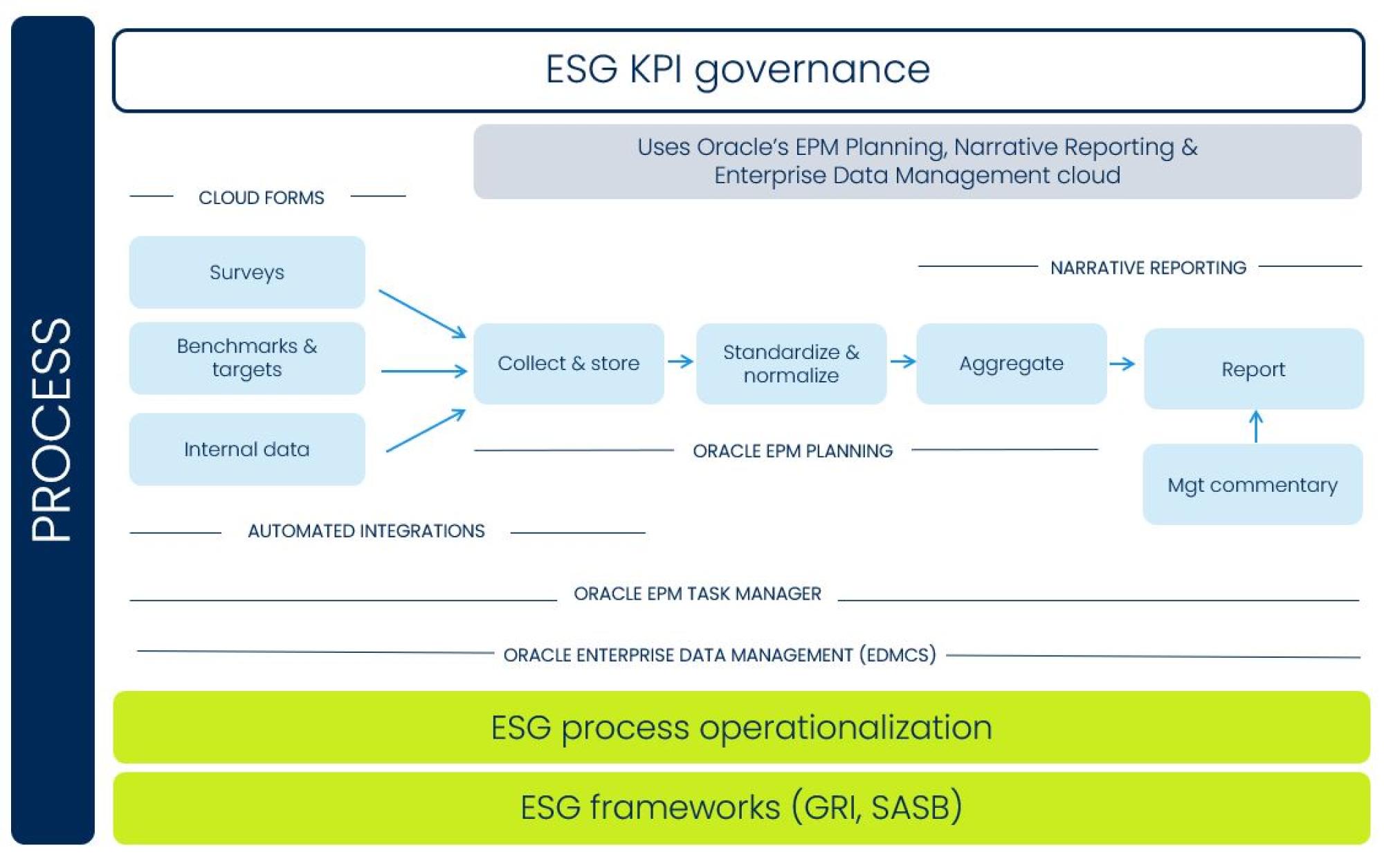Streamline Your ESG Reporting with Oracle EPM for Sustainability for a transparent, compliant, and future-ready approach
Environmental social governance (ESG) and sustainability reporting is important when it comes to measuring the impact of an organization’s policies and procedures for a sustainable future. ESG reporting has an impact on an organization’s brand, revenue, company valuation, and market perception. As ESG metrics become increasingly important, integrating them into business strategies is no longer optional but necessary. Around the world, legislators have adopted proposals to increase sustainability reporting requirements. Over the coming years, these regulatory changes are likely to have a significant impact on your organization. An effective ESG reporting strategy not only reflects an organization's commitment to sustainable development but also enhances its operational efficiency and long-term profitability. In this article, we will explore the industry challenges around ESG and how Oracle’s new Oracle EPM for Sustainability can help your organization rapidly deploy a reporting and governance framework to meet these challenges.
Understanding the ESG framework
The ESG framework encompasses three critical pillars that shape sustainable and ethical business practices:
- Environmental: This pillar focuses on the company's impact on the earth, encompassing waste management, resource conservation, and carbon footprint reduction.
- Social: This aspect deals with the company's relationships and reputation within its community, including labor practices, diversity, and inclusion.
- Governance: Governance involves the internal systems and controls that dictate corporate behavior, decision-making processes, compliance with the law, and meeting external stakeholder needs.
Developing an ESG reporting strategy: 4 steps for success
An effective ESG reporting strategy involves several key steps.
- Assess current ESG performance: evaluate your existing ESG performance and benchmark it against industry standards to identify areas for improvement.
- Set clear and measurable goals: define what you aim to achieve with your ESG initiatives and how you will measure success.
- Integrate ESG into business planning: ensure that ESG considerations are woven into the fabric of your business operations and decision-making processes.
- Engage stakeholders: communicate your ESG strategies and progress to stakeholders, including investors, customers, and employees.
Benefits of a strong ESG strategy
Organizations that implement a robust ESG strategy can reap numerous benefits, such as:
- Increased investor confidence: a strong ESG proposition can attract investors who are increasingly looking to fund sustainable and socially responsible businesses.
- Enhanced brand value: companies with a clear ESG commitment can improve their brand image and customer loyalty.
- Operational excellence: ESG initiatives often lead to more efficient use of resources and reduced operational costs.
- Risk mitigation: by proactively addressing ESG concerns, companies can avoid potential legal and reputational risks.
Oracle EPM for sustainability: a new solution for ESG reporting and planning
In today’s environment of evolving ESG requirements, you’ll be slowed down by disconnected point solutions that require extensive customization and are costly and difficult to maintain. You need a solution that is connected and complete, one that can easily adapt to meet your planning and reporting needs as they evolve. Supply chain, human resources, ERP, and other operational systems all provide key data at different granularity and different standards. You need to collect, convert, standardize, and aggregate this data for a complete, consistent picture of your organization.
Recently, Oracle released Oracle EPM for Sustainability which uses Oracle Cloud Enterprise Performance Management (EPM) to provide a single source of truth for ESG reporting. Oracle’s EPM for Sustainability tool provides prebuilt KPIs, metrics, carbon calculators, input templates, dashboards, and reports that include emissions, social, and governance.
Oracle EPM for Sustainability is a best-practice solution configured on the planning business process that helps you manage challenges in both the reporting and planning aspects of ESG information. The Oracle EPM for Sustainability solution is built on best practices and is highly configurable to meet your unique business requirements. The solution provides faster time to value, a foundational approach to ESG information, a reduced implementation timeline, and is designed with the end user in mind.
EPM for Sustainability delivers a future-proofed and foundational ESG Reporting and Planning solution that supports the rapid deployment of a single source of truth relating to ESG requirements:
- Includes pre-built KPIs, metrics, carbon calculators, input templates, dashboards, and reports.
- Displays emissions by Scope 1, 2, and 3 (purchased goods and services, waste, and water).
- Includes social, governance, and all other required disclosure metrics.
- Mapped to common Green House Gas (GHG) protocol outputs.
- Supports all ESG Reporting frameworks (for example, CSRD, TCFD, ESRS, IFRS, GRI).
- Supports legal entity, organization, business unit, and line of business reporting.
- Rapidly create plans/forecasts and initiatives for the future.
- Provides the agility and flexibility to map to organizational requirements and expand over time.
Oracle Cloud EPM's advanced features for ESG
Oracle Cloud EPM makes it easy for business users to consume business processes in one complete connected experience. Some powerful features for ESG include:
- Microsoft Office integration, including comprehensive integration with Excel for ad-hoc analysis and interactions with your business processes. (Smartview)
- Rich, highly formatted and interactive reporting capabilities to meet ESG reporting needs.
- Full management and narrative reporting to combine data and narrative in a controlled process.
- Interactive dashboard capabilities to allow KPI monitoring and visualization of trends and anomalies.
- Robust workflow engine to manage approvals and workflow in each business process.
Manage and align ESG enterprise data
ESG data is sourced from many systems across the organization, including ERP, HR, supply chain and other operational systems, and often in different standards and frameworks. It is imperative that you connect, manage, and standardize the enterprise data across these systems for a consistent view of metrics, regardless of source system, across multiple ESG frameworks.
By using Oracle EPM for Sustainability and Enterprise Data Management, you can:
- Improve ESG reporting business processes with built-in approval workflows to securely and efficiently distribute ESG enterprise data
- Standardize enterprise data definitions for company-wide alignment
- Easily adapt to new reporting mandates, frameworks and standards by establishing one master record of ESG metrics
- Ensure compliance and accuracy with accountability and audit capabilities
Alithya’s approach to ESG reporting
Utilizing Oracle EPM for Sustainability, Alithya’s approach covers all areas of ESG.
- Alithya’s Empowered ESG Reporting uses Oracle EPM Cloud to facilitate the collection, standardization and presentation of ESG measures alongside management’s commentary.
- We operationalize your ESG reporting process by defining measures in an auditable repository, defining organizational targets, and comparing them against industry benchmarks.
- We use Oracle EPM Planning and Task Manager to automate data collection surveys on an automated schedule to collect non-systematized data.
- Once KPI data is captured it is normalized, as an example: capturing miles driven in US and kilometer driven in EU, normalizing, and converting into CO2 used.
- You can continuously manage the lifecycle governance of ESG KPI measures creating, using and retiring measures while capturing internal approvals.

Take action towards sustainable growth with ESG
Starting with ESG is not just about compliance or public image; it's about building a sustainable business that can thrive in the long term. By taking proactive steps towards ESG excellence, companies can not only contribute to a better world but also unlock new opportunities for growth and success.
For more detailed guidance on kickstarting your ESG reporting efforts, check out a short demo of Oracle EPM for Sustainability. Contact us to learn more about how we can support your ESG efforts.
